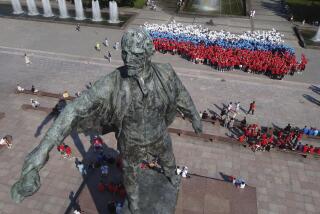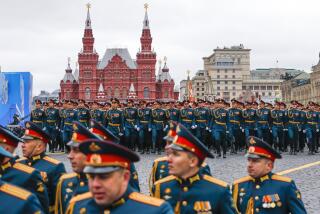A REVOLUTIONARY TURNING POINT : As Soviet Socialist Myth Ebbs, What Will Take Its Place?
- Share via
Will the Soviet Union survive this century? Until last week only hopelessly anti-Soviet critics raised such a question, basing their views more on hope than analysis.
But then Mikhail S. Gorbachev announced his intention to end the political monopoly that the Communist Party has enjoyed in the Soviet Union since 1917. It was the political equivalent of an army abolishing its officer corps. For the unifying force within the Soviet Union, its central nervous system, has been the Communist Party, which has controlled every aspect of Soviet life through party structures operating behind the scenes.
In Imperial Russia, Finland had almost complete internal autonomy, and the Muslim peoples of Central Asia and the primitive peoples of Siberia had a large measure of autonomy based on Muslim law or tribal customs. But the Bolshevik triumph ended such local pockets of autonomy. Although Finland and the Baltic states managed to gain their independence, everywhere else power flowed into the hands of a centralized Communist Party. Although the Soviet constitution accords each republic the right to secede, it was only a paper right as long as the Communist Party continued to play the role it had since 1917. The Communist Party was the Soviet Union--or at least seemed to be.
What will happen if the party now relinquishes its centralizing power? It would seem inevitable that many parties rising in the different republics will be based on nationality. For a number of them, secession will inevitably be a goal. In the past the center would have responded to such a threat with an order to the army and the secret police to quash all nationalist tendencies. But use of military forces would destroy the reforms Gorbachev needs to transform the Soviet Union into a modern state.
Indeed, Gorbachev’s action raises fundamental questions about the forces that hold together any modern state. Usually unity is the result of history, habit, common language and mutual advantage. But at times these forces are not sufficient. Then statesmen normally rely on two basic instruments--force and nationalism.
The difficulty for multinational states, however, is that nationalism may divide as much as it unites. Such states are, therefore, driven to some form of ideology as the cement that will hold together otherwise distinct parts. In the United States and the Soviet Union, for example, a combination of ideology and economic success plays an extraordinary role in the internal cohesion of both societies. People of many nationalities chose to come to America; people of many nationalities were forced to become part of the Soviet Union. An important myth in both societies--central to their internal cohesion--has been that the American way or the socialist model justifies the continued allegiance of diverse nationalities.
But the economic setbacks of the last two decades have robbed the socialist myth of much of its earlier power. It is difficult to remain loyal to something that so clearly does not work. (Evidence that the Japanese model of guided capitalism or the German path of social market economy continues to outstrip the American economy may also be damaging to the American faith in their own “city on a hill.”)
For states that are not multinational, the role of ideology in the maintenance of national unity is less important. China survives as China regardless of the nature of the regime in Beijing. France is France whether or not the government in power pursues “la gloire. “ German nationalism has survived the complete collapse and ultimate extirpation of a vicious ideology that attempted to bind Germans to one another.
The Soviet Union is different. As in states as opposed as East Germany, Israel or the United States, there is a symbiotic relationship in the U.S.S.R. between the state and its ideology. An East Germany that is not Marxist-Leninist has no reason not to join with West Germany. An Israel that is not Zionist has no reason not to agree to a binational state with the Palestinians. An America that does not provide equal and adequate opportunities to all of its citizens regardless of race will over time develop separatist tendencies. Similarly, a Soviet Union without the Communist Party enjoying a constitutional monopoly on power would seem to lose its raison d’etre.
Gorbachev’s gamble last week is therefore extraordinary. In his courageous effort to convert the Soviet Union to a normal, modern and decent country, he is taking a risk that few statesmen in any age or any political system have dared. He is gambling with the very survival of his own country, assuming that country is the Soviet Union and not Russia.
During our own Civil War, Abraham Lincoln made it repeatedly clear that preservation of the Union was more important to him than an end to slavery. He freed the slaves only when it was clear that this action would help the Northern cause. In contrast, Gorbachev is making it clear that continuation of perestroika and glasnost is even more important to him than preservation of one of the instruments critical to the unity of the Soviet Union--the party and its role in the governance of the country.
He may have concluded that over the long run, the choice was between the regime and its people. The union might be subject to less immediate strain if he maintained the central role of the Communist Party, but the country as a whole would continue its decline.
In the face of ethnic hatreds, economic decline and political conflict, is it possible that nonetheless the center will hold and the union will endure? It seems likely that the Baltic states will achieve some form of independence and the states of Central Asia much greater autonomy--for some even independence. But the realities of mutual economic dependence and the unlikelihood of any large-scale assistance from the outside world may exercise a countervailing force that will make the break less complete.
The ultimate facts of the Soviet Union will be decided in the cities and villages of Russia and the Ukraine. These two republics have nearly 70% of the people and a vast stretch of territory reaching from Central Europe almost to Japan.
To hold this area together, Gorbachev must succeed rapidly in developing a successful form of socialism with a human face. Those who expect him to jettison socialist ideals are mistaken; they are the principal cement he has left to try to draw the country together. But he must persuade people that notwithstanding the monstrous crimes of the past, those ideals remain valid and can provide a decent life to his people.
The world is watching one of the great gambles of history by a towering figure. The odds clearly are against Gorbachev. But he governs a nation that has repeatedly astonished the world both by its achievements and by its excesses. And no figure on the world stage today combines such intelligence with such audacity.
More to Read
Sign up for Essential California
The most important California stories and recommendations in your inbox every morning.
You may occasionally receive promotional content from the Los Angeles Times.













